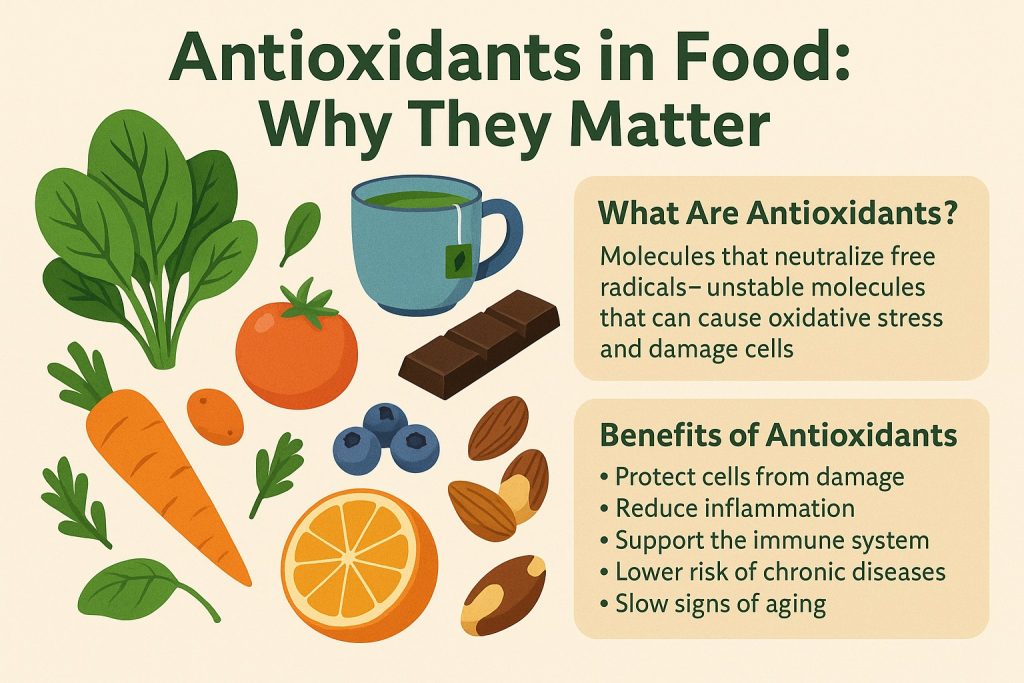Antioxidants have become a buzzword in health and nutrition—but what are they really, and why are they important? Found naturally in many plant-based foods, antioxidants protect our cells from oxidative stress, a process that contributes to aging and many chronic diseases. A diet rich in antioxidants is key to long-term health, disease prevention, and cellular protection.
What Are Antioxidants?
Antioxidants are molecules that neutralize free radicals—unstable atoms or molecules that can damage cells, proteins, and DNA. Free radicals form naturally during:
- Normal metabolism
- Exposure to pollution, UV radiation, tobacco smoke, and processed food
- Chronic stress and inflammation
When free radicals accumulate, they create oxidative stress, which is linked to:
- Aging
- Cancer
- Heart disease
- Diabetes
- Neurodegenerative disorders (e.g., Alzheimer’s)
Antioxidants help maintain cellular balance and prevent damage before it starts.
Key Antioxidants and Their Roles
| Antioxidant | Function | Common Food Sources |
|---|---|---|
| Vitamin C | Protects skin and immune cells; regenerates other antioxidants | Citrus fruits, bell peppers, broccoli |
| Vitamin E | Protects cell membranes from oxidation | Nuts, seeds, vegetable oils |
| Beta-carotene | Precursor to vitamin A; supports vision and immunity | Carrots, sweet potatoes, spinach |
| Selenium | Supports enzyme activity and immune defense | Brazil nuts, fish, whole grains |
| Flavonoids and polyphenols | Plant compounds with anti-inflammatory and antioxidant effects | Berries, tea, cocoa, apples, onions |
Foods Rich in Antioxidants
Eating a variety of colorful, whole plant foods is the best way to get natural antioxidants:
- Berries: Blueberries, raspberries, blackberries
- Leafy greens: Kale, spinach, chard
- Orange and red vegetables: Carrots, beets, tomatoes, bell peppers
- Nuts and seeds: Almonds, sunflower seeds, flaxseeds
- Whole grains: Oats, quinoa, buckwheat
- Herbs and spices: Turmeric, cinnamon, oregano
- Dark chocolate and green tea (in moderation)
Cooking and storage can reduce antioxidant content, so a mix of raw and lightly cooked vegetables is ideal.
Benefits of Antioxidants
- Protect DNA and cellular structures
- Reduce inflammation throughout the body
- Support the immune system and tissue repair
- Lower risk of heart disease, cancer, and metabolic disorders
- Slow signs of aging in the skin and organs
However, balance matters—excessive intake of antioxidant supplements (especially synthetic forms) may be harmful. It’s best to get them through natural food sources.
Should You Take Antioxidant Supplements?
In most cases: No, unless prescribed.
- Whole foods provide a balanced mix of antioxidants with fiber, vitamins, and co-factors.
- Isolated antioxidant pills may interfere with natural cell processes or lose effectiveness.
Glossary
- Oxidative stress — Damage caused by excessive free radicals in the body.
- Free radicals — Unstable molecules that can harm cells and DNA.
- Flavonoids — Plant-based antioxidants found in colorful fruits and vegetables.
- Beta-carotene — A compound that converts into vitamin A in the body.
- Polyphenols — A group of antioxidants found in plant foods, tea, and wine.


